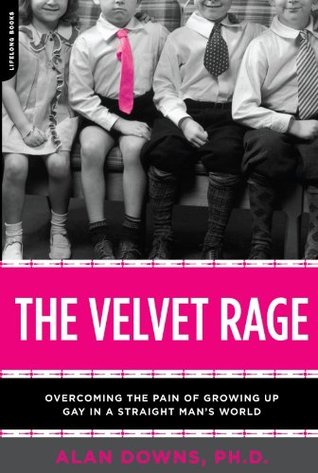More on this book
Community
Kindle Notes & Highlights
by
Alan Downs
Read between
June 21, 2018 - January 21, 2019
gay men in stage two can become absolute geniuses at invalidating each other.
He knows to expect invalidation, and he is armed with fistfuls of it in return.
the gay man experiences a hunger for validation and a hypersensitivity to invalidation.
he may become so sensitized to invalidation that he begins to see it everywhere he turns in life.
as if by intention he were eliminating from sight all tra...
This highlight has been truncated due to consecutive passage length restrictions.
he must discover the secret of authentic validation.
The steep climb out of stage two and the depression it can sometimes trigger is found in the simple process of rediscovering the essence of the self.
we must first face our core of shame.
It quakes even the most stable part of our soul,
when a gay man in stages one or two makes a mistake, he is slow to admit it and stubbornly refuses to revisit the mistake in order to learn how he might do things better.
difficulty in learning from past mistakes.
so the second-best thing he can do is avoid the memory of the mistakes, or try to “cook the books” and construe the mistake as something other than an error.
he often handles them by blaming them on the shortcomings of his former partner. The more he pushes the memories away, the more effectively he avoids shame.
the client seeks is support for his defensive behaviors.
He wants the therapist to collude with him in blaming his ex-partners, ex-bosses, or former friends. If the therapist is unwilling to do so, the client may become angry toward the therapist and be unwilling to continue.
the only way to reduce shame is to expose oneself to it.
He may even develop relationship hopelessness and decide that this is all relationships will ever be for him.
the slow process of learning to tolerate and reduce shame rather than avoid it.
With the shame reduced, he can begin the work of clearly seeing his own behavior patterns and making needed changes.
use sex as Kyle did: to help manage their emotions.
Whenever they start to feel lonely, sad, anxious, or bored, they head to the local gay bar, bathhouse, park, rest stop, chat room . . . you name it, to meet up for quick, anonymous sex.
process addiction—using a behavior to regulate your mood.
“I’ll always be lonely, and eventually die a lonely old man.”
the more a gay man tries to avoid confronting his loneliness, the more control the emotion has over his life.
The authenticity that is sought in stage three is fundamentally inconsistent with the use of sex as an emotion regulation method. In stage three, the gay man must learn other ways than just sex to control his emotions, improve his mood, and to find joy in life.
Is there such a thing as a healthy relationship between two men?
It’s about no longer needing to compensate for shame and living your life without needing to gild it with the extraordinary.
The one and only skill that resolves the crisis of meaning is that of acceptance.
Learning to accept the things in life as they are in the present moment. You’re growing older, your boyfriend’s getting fatter, your job isn’t totally amazing, and where you live can often be boring. To repeat a cliché that I often breathe to myself: “It is what it is.”
You don’t need to be more spiritual, richer, friendlier, better looking, younger, or living on a beach. In this moment, all you need to be is you. Only in that space will you find lasting contentment.
The parts of his life that are rooted in the practices of avoiding shame, splitting, and achieving inauthentic validation no longer work for him.
how shall he spend his evenings?
how will he entertain himself?
where will he spend h...
This highlight has been truncated due to consecutive passage length restrictions.
starts with a small change and ends with a radical difference.
His father had no knowledge of this journey, nor did any of his likely role models.
his visibility in the gay community often diminishes.
He may, in fact, no longer feel the need to visit the gay ghetto.
This is unfortunate for young men, for they are unable to see the healthy progression from shame to freedom.
It isn’t conceivable to them that many of the gay men who “disappear” do so because they have outgrown the need for the avoidance of shame and acquisition of validation that is at the core of so much of mainstream gay culture.
best described as a time of ongoing ambiguity.
The great danger inherent in stage three is that the gay man will foreclose on ambiguity.
he attempts to create artificial clarity and too quickly defines an endpoint to his journey.
gradual, organic change that seems to flow naturally in life.
Resolution requires that we tolerate the distress of the crisis long enough to resolve it rather than escape it.
complete acceptance of the self and elimination of toxic shame.
no longer holding the core belief that he is flawed and unacceptable, and consequently spending most of his energy managing, silencing, and avoiding shame.
he has come to a place of accepting himself as a man who has the potential ...
This highlight has been truncated due to consecutive passage length restrictions.


